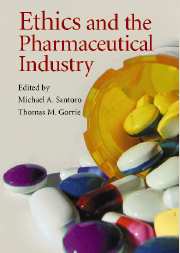Book contents
- Frontmatter
- Contents
- Tables
- Figures
- About the Editors
- Contributors
- Preface
- Acknowledgments
- Foreword
- Introduction: Charting a Sustainable Path for the Twenty-First Century Pharmaceutical Industry
- PART I PROFITS, PATIENTS' RIGHTS, AND SCIENTIFIC PROGRESS: THE ETHICS OF CLINICAL RESEARCH CONDUCTED IN PRIVATE ENTERPRISES
- PART II MARKETING AND THE EFFICIENT UTILIZATION OF HEALTHCARE RESOURCES: ETHICAL AND PUBLIC POLICY CHALLENGES
- PART III PATENTS, PRICING, AND EQUAL ACCESS
- Introduction to Part III
- 15 Intellectual Property Rights, Access to Life-Enhancing Drugs, and Corporate Moral Responsibilities
- 16 A Future Agenda for Government–Industry Relations
- 17 AIDS Activism and the Pharmaceutical Industry
- 18 The Campaign Against Innovation
- 19 Third World Perspectives on Global Pharmaceutical Access
- 20 The Promise of Vaccines and the Influenza Vaccine Shortage of 2004: Public and Private Partnerships
- PART IV CONCLUDING THOUGHTS: CHARTING A SUSTAINABLE PATH FOR THE TWENTY-FIRST CENTURY
- Notes
- Index
19 - Third World Perspectives on Global Pharmaceutical Access
Published online by Cambridge University Press: 04 December 2009
- Frontmatter
- Contents
- Tables
- Figures
- About the Editors
- Contributors
- Preface
- Acknowledgments
- Foreword
- Introduction: Charting a Sustainable Path for the Twenty-First Century Pharmaceutical Industry
- PART I PROFITS, PATIENTS' RIGHTS, AND SCIENTIFIC PROGRESS: THE ETHICS OF CLINICAL RESEARCH CONDUCTED IN PRIVATE ENTERPRISES
- PART II MARKETING AND THE EFFICIENT UTILIZATION OF HEALTHCARE RESOURCES: ETHICAL AND PUBLIC POLICY CHALLENGES
- PART III PATENTS, PRICING, AND EQUAL ACCESS
- Introduction to Part III
- 15 Intellectual Property Rights, Access to Life-Enhancing Drugs, and Corporate Moral Responsibilities
- 16 A Future Agenda for Government–Industry Relations
- 17 AIDS Activism and the Pharmaceutical Industry
- 18 The Campaign Against Innovation
- 19 Third World Perspectives on Global Pharmaceutical Access
- 20 The Promise of Vaccines and the Influenza Vaccine Shortage of 2004: Public and Private Partnerships
- PART IV CONCLUDING THOUGHTS: CHARTING A SUSTAINABLE PATH FOR THE TWENTY-FIRST CENTURY
- Notes
- Index
Summary
INTRODUCTION
This chapter has two primary objectives. First, it critically appraises the efficacy of the claim embraced in U.S. policy and by brand name pharmaceutical companies that poverty is by far the most critical barrier to affordable antiretrovirals in the third world. The chapter contextualizes the affordability of antiretovirals within a broader crucible of factors that include extremely strong legal protection of patents, lack of or slow third world government attention to the crisis, and economic programs that have greatly lowered funding for public health infrastructure.
Second, the chapter looks to the future, particularly with a view to assessing what lessons can be learned from missteps and policies in addressing the question of access to antiretrovirals. For example, the lowering of prices of patented antiretrovirals and the wider availability of generic antiretrovirals in the last five years have increased the number of people who have access to the drugs. Lower prices and increased access, though modest, undermine the claim that patents are not integral to lack of access to affordable antiretrovirals. Wider and broader access to antiretrovirals requires re-examining these and other assumptions that have been challenged by experience and whose revision is required to arrest the pandemic's already disastrous effect on the third world.
Extremely strong legal protection of patents plays a role in limiting access to essential medicines
Strong patent protection is founded on the view that patents are private property rights that confer unconditional rights over inventions and discoveries.
- Type
- Chapter
- Information
- Ethics and the Pharmaceutical Industry , pp. 336 - 351Publisher: Cambridge University PressPrint publication year: 2005
- 2
- Cited by



